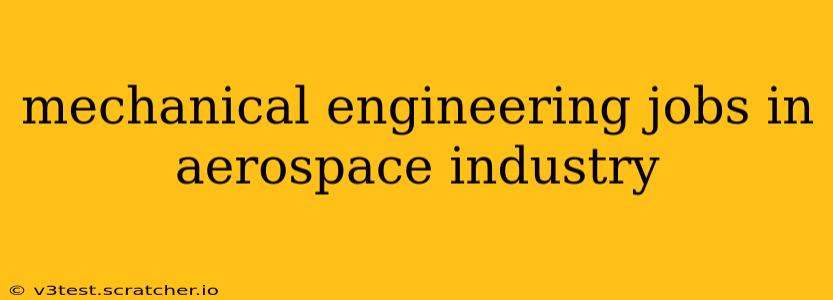The aerospace industry offers a thrilling and challenging career path for mechanical engineers. From designing cutting-edge aircraft to developing innovative spacecraft, the opportunities are vast and varied. This guide delves into the diverse roles available, the required skills, and the path to securing a successful career in this exciting field.
What Types of Mechanical Engineering Jobs Exist in Aerospace?
The aerospace industry demands a wide range of mechanical engineering expertise. Here are some key roles:
-
Aerospace Design Engineer: This role focuses on the conceptualization, design, and development of aircraft, spacecraft, and their components. This includes everything from airframes and engines to landing gear and flight control systems. Proficiency in CAD software and a deep understanding of aerodynamics, structural mechanics, and materials science are essential.
-
Manufacturing Engineer: These engineers oversee the manufacturing process of aerospace components and systems. They optimize production lines, ensure quality control, and implement lean manufacturing principles to improve efficiency and reduce costs. A strong understanding of manufacturing processes, materials, and quality control methodologies is crucial.
-
Test Engineer: These engineers plan and execute rigorous testing procedures to validate the performance and reliability of aerospace systems. They might conduct wind tunnel tests, flight tests, or component-level testing. Analytical skills, meticulous attention to detail, and experience with data acquisition and analysis tools are essential.
-
Research and Development Engineer: These engineers are at the forefront of innovation, working on cutting-edge technologies and developing new aerospace systems. They conduct research, experiment with new materials and processes, and contribute to the advancement of aerospace engineering. A strong academic background and a passion for innovation are key requirements.
-
Thermal Engineer: Responsible for managing heat transfer and thermal control in aerospace vehicles. They design and analyze thermal protection systems, ensuring components operate within their temperature limits. Strong understanding of thermodynamics, heat transfer, and fluid mechanics is essential.
-
Structural Engineer: These engineers are responsible for ensuring the structural integrity and safety of aerospace vehicles. They use advanced analysis techniques to design structures that can withstand extreme loads and environmental conditions. A solid understanding of structural mechanics, finite element analysis (FEA), and material science is essential.
-
Propulsion Engineer: Responsible for the design, development, and testing of propulsion systems, including engines, rockets, and related components. Deep understanding of thermodynamics, fluid mechanics, combustion, and propulsion systems is crucial.
What Skills Do Aerospace Mechanical Engineers Need?
Beyond the technical knowledge mentioned above, successful aerospace mechanical engineers possess several key soft skills:
-
Problem-Solving: Aerospace engineering often presents complex challenges requiring creative and analytical problem-solving skills.
-
Teamwork: Most aerospace projects involve large teams, demanding strong collaboration and communication skills.
-
Communication: Effectively communicating technical information to both technical and non-technical audiences is essential.
-
Adaptability: The aerospace industry is constantly evolving, requiring engineers to adapt to new technologies and challenges.
-
Attention to Detail: Precision and accuracy are critical in aerospace engineering, where even small errors can have significant consequences.
What Education and Experience Are Required?
A bachelor's degree in mechanical engineering is typically the minimum requirement for entry-level positions. A master's degree or PhD can significantly enhance career prospects, particularly in research and development roles. Internships and co-op experiences within the aerospace industry provide valuable practical experience and networking opportunities.
People Also Ask:
What is the salary of a mechanical engineer in the aerospace industry? Salaries vary significantly depending on experience, location, company, and specific role. However, aerospace engineering generally commands competitive salaries, often higher than the average for mechanical engineers in other industries.
What are the career paths for a mechanical engineer in aerospace? Career paths are diverse and can lead to specialized roles (e.g., propulsion, structural analysis), management positions, or entrepreneurial ventures. Continuous learning and professional development are crucial for career advancement.
Is aerospace engineering a good career choice? Yes, for those with a passion for engineering and a strong interest in aviation and space exploration, aerospace engineering offers a rewarding and intellectually stimulating career path. The industry provides opportunities to work on cutting-edge technologies and contribute to significant advancements in aviation and space travel.
How do I get a job in aerospace engineering? Networking, internships, strong academic performance, and a well-crafted resume and cover letter are all crucial. Targeting specific companies and attending industry events can also significantly improve your chances.
What software do aerospace mechanical engineers use? Common software includes CAD packages (e.g., CATIA, NX, SolidWorks), FEA software (e.g., ANSYS, Abaqus), and specialized aerospace simulation tools.
This guide provides a comprehensive overview of mechanical engineering jobs within the aerospace industry. Remember to continuously update your skills and knowledge to remain competitive in this dynamic and ever-evolving field.
